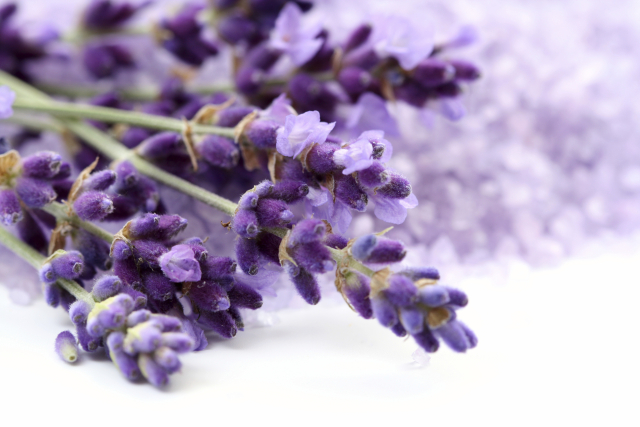
Who would have thought that a medicine could smell so lovely? The oils in lavender, long valued for making perfumes, soaps and scented sachets, also aid digestion, ease anxiety and help to dismiss insomnia. There’s even scientific evidence that one of the oils in lavender, penilyl alcohol, may one day play a role in treating cancer.
What’s it good for?
- anxiety
- athlete’s foot
- bites and stings
- body odour
- dandruff
- ear problems
- foot odour
- headache
- head lice
- insomnia
- oily skin
- wind
A perennial shrub with spikes of purple or light blue flowers, lavender has a long history of healing. The dried flowers can be sewn into a pouch and tucked under the pillow to restore restful sleep. The lavender aroma comes from airborne molecules of linalyl esters, oils that stimulate the olfactory nerve in the brain and calm the central nervous system. The mere smell of lavender may be as effective for setting the stage for peaceful rest as more powerful (and potentially habit-forming) sleep drugs.
Lavender is also the herb to look to when you’re feeling anxious or tense. Researchers have discovered that lavender increases the type of brain waves associated with relaxation. Add some lavender oil to a diffuser to disperse the scent throughout a room. If you don’t have a diffuser, add 3 drops of lavender oil to a bowl of steaming water and inhale the steam. When you have the luxury of time, add lavender bath oil or a handful of dried lavender flowers to bathwater for a stress-busting soak.
It’s no coincidence that massage oils are often infused with lavender. The essential oils in lavender are easily absorbed through the skin and their sedative effects on the central nervous system can help you to feel relaxed. Unlike other essential oils, lavender oil (sold in health-food shops) can be applied directly to the skin. But it can cause severe sensitivity and should be used with caution. You can also mix it with alight carrier oil such as olive oil. Other uses for lavender are:
- Headache medicine Apply a little oil to each temple when you have a headache and massage it in for remarkable relief.
- Tummy tamer German doctors often recommended lavender tea as a digestive aid. The oils relax the smooth muscles of the digestive tract and soothe after-meal cramps in the stomach and intestine. Lavender also helps to ease intestinal wind. To make an infusion, steep a heaped teaspoon of lavender flowers in a cup of boiling water for 10 minutes and strain.
- Infection fighter The tannins in lavender kill bacteria and help to prevent minor cuts and grazes from becoming infected. Soak a clean cloth in a lavender fusion and apply the compress to the wound.
- Ear soother The same chemical compound in lavender that fights skin infections will knock out the itch and irritation of swimmer’s ear.
- Pain reliever Lavender oil has minor painkilling properties. It appears to reduce the transmission of nerve impulses that carry pain signals. Mix a few drops the oil into a tablespoon of carrier oil and rub it in. Lavender also relieves itching, thanks to its anti-inflammatory action. It’s the perfect remedy for insect bites and stings.
How lavender may, one day, combat cancer
Cancer specialists have observed that a class of chemical compounds in lavender called monoterpenes appear to inhibit the development of cancerous cells and may help to prevent them from multiplying. Early laboratory research suggests that monoterpenes such as perillyl alcohol may inhibit soft-tissue cancers, such as those in the liver, breast and prostate gland. These compounds have even been shown to slow down the growth of colon and liver tumours.
It is too early to say for definite that lavender has beneficial effects on cancer. But early results are so promising that the essential oils are being tested in clinical studies for possible anti-cancer potential.
